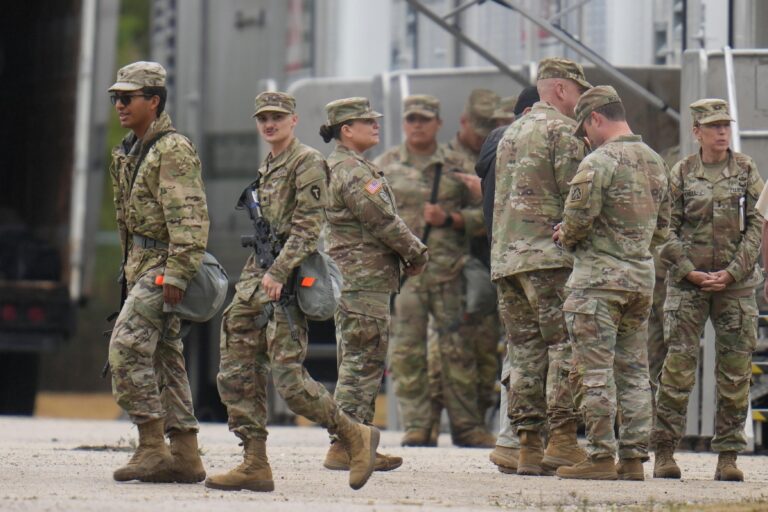Chicago and Illinois Oppose Federal National Guard Deployment Following Portland Court Decision
In a decisive legal maneuver, Chicago along with the state of Illinois has filed a lawsuit aiming to prevent the Trump administration’s plan to station National Guard troops within their jurisdictions. This action comes on the heels of a pivotal federal court ruling in Portland, Oregon, which curtailed the federal government’s ability to deploy military forces amid ongoing protests. The lawsuit contends that the federal plan constitutes an excessive assertion of power, threatening civil liberties and blurring the lines between military and civilian law enforcement roles.
The challenge is grounded in several critical arguments:
- Constitutional protections: The suit stresses the importance of safeguarding local governance from unwarranted federal interference.
- Past lessons: It references prior episodes where federal militarization intensified unrest rather than restoring peace.
- First Amendment rights: Concerns are raised about potential infringements on freedoms of speech and peaceful assembly.
These points fuel a broader discourse on the appropriate limits of federal intervention, with Chicago and Illinois advocating for a more measured and accountable approach.
| Aspect | Chicago & Illinois Stance | Federal Government Approach |
|---|---|---|
| Objective of Deployment | Prioritizing local oversight and community safety | Federal enforcement aimed at suppressing protests |
| Legal Foundation | Emphasis on states’ rights and constitutional limits | Presidential authority under the Insurrection Act |
| Main Concerns | Potential civil rights violations | Use of military force in civilian environments |
Constitutional and Public Safety Grounds for Opposition
Central to Chicago and Illinois’ lawsuit is the defense of state sovereignty as enshrined in the Tenth Amendment. The plaintiffs argue that the federal government’s unilateral deployment of National Guard units, absent explicit state approval, infringes upon Illinois’ constitutional prerogative to oversee its own security forces and emergency management. This federal action risks disrupting established command structures, leading to jurisdictional confusion and undermining effective crisis response.
Beyond constitutional issues, the lawsuit underscores important public safety concerns. Officials warn that introducing federally controlled National Guard troops, potentially armed with aggressive tactics, could exacerbate tensions in urban areas rather than quell them. The complaint cites the Portland ruling as a legal benchmark, highlighting how unchecked militarization has historically eroded community trust and complex lawful public order maintenance.
- State control: Illinois asserts that federal deployment encroaches on powers reserved to the state.
- Community impact: Federal intervention risks inflaming protests and unrest.
- Command clarity: Overlapping authorities threaten operational effectiveness.
| Legal Foundation | Core Concern | Potential Outcome |
|---|---|---|
| Tenth Amendment | State Authority Over Military Forces | Challenge to federal overreach |
| Public Safety Doctrine | Risk of Heightened Violence | Potential escalation of civil unrest |
| Portland Court Decision | Restrictions on Federal Military Deployment | Legal precedent limiting federal action |
Federal vs. State Authority in National Guard Activations: Broader Implications
The lawsuit brought by Chicago and Illinois intensifies the ongoing national conversation about the division of power between federal and state governments concerning National Guard mobilization. This dispute raises pivotal questions about the extent of presidential authority to activate National Guard units without state consent, especially in politically charged environments such as mass protests.
Key themes emerging from this conflict include:
- Preservation of state sovereignty: Governors assert their constitutional right to command their National Guard forces unless federalized through proper channels.
- Concerns over federal overreach: Judicial bodies are increasingly called upon to delineate the boundaries of executive power in domestic military deployments.
- Setting legal precedents: Court rulings in this arena will shape future policies on the use of armed forces for internal security.
| Authority | Role in National Guard Deployment | Legal Framework |
|---|---|---|
| State Governor | Commands Guard units unless federalized | State Constitutions and Militia Acts |
| President | Can federalize Guard under specific laws | Insurrection Act and Federal Statutes |
| Judiciary | Resolves disputes over deployment authority | Judicial Review and Constitutional Interpretation |
Policy Guidance for Harmonized National Guard Deployment and Emergency Response
To ensure that National Guard deployments effectively balance public safety with civil rights, it is essential for federal, state, and local agencies to collaborate closely. Policymakers should prioritize establishing transparent communication channels that enable timely data exchange and joint decision-making before any deployment occurs.Formalizing clear roles and responsibilities within a cooperative framework respects local authority while recognizing federal emergency powers.
Incorporating community voices into emergency planning can also help prevent misunderstandings and reduce public resistance. Standardized protocols for emergency response are vital to minimizing jurisdictional conflicts, as recent legal disputes have demonstrated. Key elements of such protocols include:
- Comprehensive pre-deployment evaluations that assess risks and legal considerations.
- Joint oversight bodies with representatives from federal, state, and local levels to supervise operations.
- Defined escalation and de-escalation procedures focused on minimizing conflict and protecting civilians.
- Regular interagency training exercises to enhance coordination, interoperability, and mutual trust.
| Protocol Component | Primary Benefit | Stakeholders Involved |
|---|---|---|
| Joint Oversight Committees | Ensures balanced governance and accountability | Federal, State, and Local Authorities |
| Risk and Legal Assessments | Reduces liability and legal challenges | Policymakers and Legal Advisors |
| Communication Protocols | Promotes transparency and community trust | Community Leaders and Agencies |
| Training Exercises | Improves operational readiness and cooperation | Emergency Responders and Military Units |
Conclusion: Navigating the Balance Between Federal Authority and State Sovereignty
As the legal proceedings unfold, the lawsuit initiated by Chicago and Illinois spotlights the persistent friction between federal power and local governance regarding National Guard deployments in domestic affairs. The verdict in this case could establish influential legal standards defining the boundaries of federal intervention and reinforcing state sovereignty. This evolving situation will be closely monitored by legislators, civil rights organizations, and the public, as the nation continues to grapple with maintaining security while upholding constitutional freedoms.





